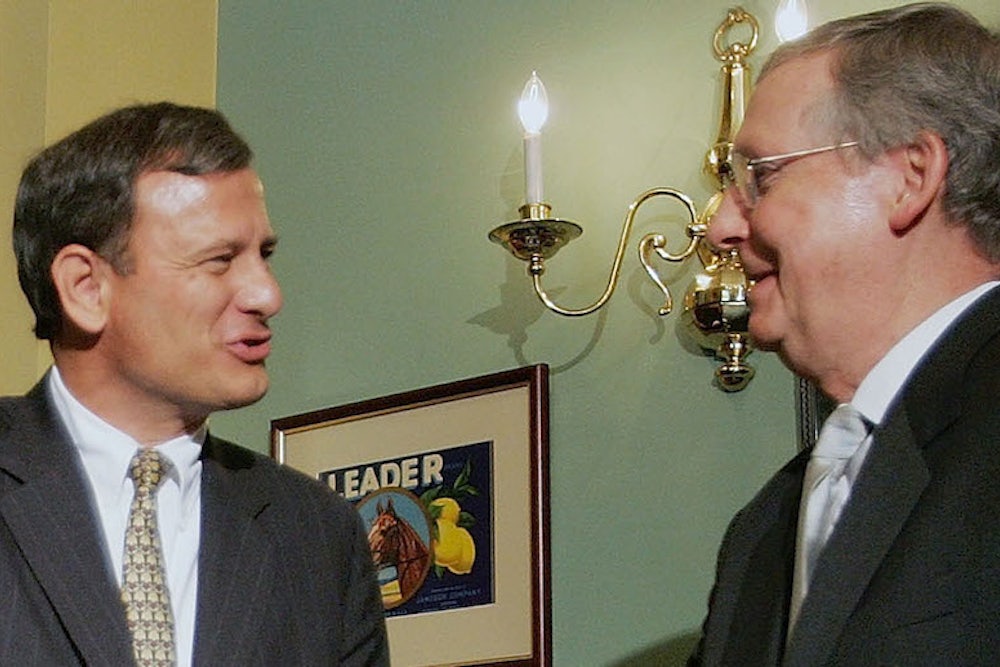The Washington Post’s Greg Sargent spots incoming Senate Majority Leader Mitch McConnell making what I believe are his first public comments about a coming Obamacare lawsuit that will determine whether the government can subsidize insurance in states that haven’t established their own exchanges.
“The chances of [Obama] signing a full repeal are pretty limited,” McConnell said at a Wall Street Journal event Monday. “Who may ultimately take it down is the Supreme Court of the United States. I mean there’s a very significant case that will be decided before June on the question of whether the language of the law means what the language of the law says, which is that subsidies are only available for states that set up state exchanges. Many states have not. If that were to be the case, I would assume that you could have a mulligan here, a major do-over of the whole thing — that opportunity presented to us by the Supreme Court, as opposed to actually getting the president to sign a full repeal, which is not likely to happen.”
This kind of mustache-twiddling candor is a McConnell trademark. But I can’t actually find anything objectionable here. Everything in that quote, down to the basic question at the heart of the challenge, is more or less accurate. It’s nothing that the law’s supporters haven’t been saying for months, from an opposing perspective, and it’s reminiscent of the kinds of things Republicans, including McConnell himself, said in anticipation the Supreme Court’s first big Obamacare ruling.
But even if this isn’t a big “a-ha!” moment, it does lay bare, for any of the justices listening, just how Republicans in Congress will react to an adverse ruling. And that could limit the arguments conservatives resort to when the Court rules in this case next year.
Chief John Roberts, for instance, has a penchant for making naive political arguments—about racism, or money in politics—to support controversial decisions. But he can’t now, in good faith, argue that Congress will clean up the mess if his Court voids subsidies in Healthcare.gov states. He could decide that the isolated phrase “Exchange established by the State” means what it says, and, while plainly a mistake, it’s not the Court’s job to fix drafting errors. But he can’t pretend not to know that Congress has no intention of fixing it either.
That McConnell’s now publicly announcing he’ll use a ruling along those lines as an “opportunity presented to us by the Supreme Court” for a “major do over” should at least make Roberts uncomfortable. The question, then, is how much does he care?
As it happens, another conservative judge has grappled with this very issue, and decided the law should be gutted anyhow. During oral arguments in a similar case before the D.C. Circuit Court of Appeals this past spring, Judge Thomas Griffith asked, “If we know the clear purpose of Congress and yet they don’t legislate clearly enough to achieve that purpose, is it our job to fix the problem?”
As it happens, unless Congress legislated in a manner clearly at odds with its purpose, it sort of is on the courts to defer to the executive branch interpretation. But in the end, the D.C. Circuit, in a since-vacated ruling, voided the subsidies anyhow. Rather than pretend that Congress would step in to fix the purported mistake, though, Griffith concluded his opinion with this mournful coda:
We reach this conclusion, frankly, with reluctance. At least until states that wish to can set up Exchanges, our ruling will likely have significant consequences both for the millions of individuals receiving tax credits through federal Exchanges and for health insurance markets more broadly. But, high as those stakes are, the principle of legislative supremacy that guides us is higher still. Within constitutional limits, Congress is supreme in matters of policy, and the consequence of that supremacy is that our duty when interpreting a statute is to ascertain the meaning of the words of the statute duly enacted through the formal legislative process. This limited role serves democratic interests by ensuring that policy is made by elected, politically accountable representatives, not by appointed, life-tenured judges. Thus, although our decision has major consequences, our role is quite limited: deciding whether the IRS Rule is a permissible reading of the ACA. Having concluded it is not, we reverse the district court and remand with instructions to grant summary judgment to appellants and vacate the IRS Rule.
The opening sentences are a tacit acknowledgement that Congress is going to relish his ruling, and that people will suffer as a result. If Roberts is genuinely as concerned about his Court’s legacy as reported, then he’ll want to avoid having to write a paragraph like this. But that’s the easy part. All it takes is not buying the tendentious argument that the challengers have identified the only plausible construction of the ACA. And most of the federal judges who’ve looked at this case have somehow managed to avoid this temptation.
